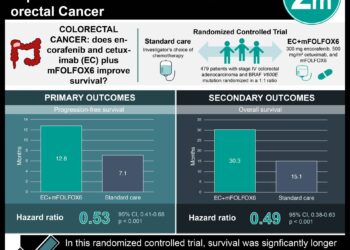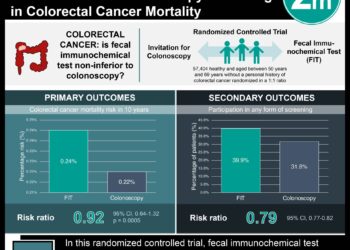Capecitabine + oxaliplatin chemoradiotherapy does not increase survival, but increases toxicity, compared to capecitabine alone in the postoperative treatment of rectal cancer
1. A randomized controlled trial of patients with stage II and III rectal cancer found that adding oxaliplatin to the standard postoperative chemoradiation treatment of capecitabine did not improve survival compared to control patients.
2. Patients who were treated with both oxaliplatin and capecitabine had a higher risk of experiencing toxic side effects.
Evidence Rating Level: 1 (Excellent)
Study Rundown: Colorectal cancer (CRC) is one of the most common malignancies worldwide, with rectal cancer comprising approximately 1/3 of new CRC diagnoses. Postoperative chemoradiotherapy has been shown to reduce recurrence risk and improve survival, although the optimal systemic therapy agents & treatment schedule are not known. This is particularly true in recent years with the introduction of several novel agents which have shown success in preclinical studies, or in treating other forms of cancer. This study is the first randomized trial to assess the efficacy of adding oxaliplatin to routine capecitabine therapy after surgery for resectable rectal cancer. Li et al performed a multicentre, randomized controlled trial beginning in 2008; 589 patients with stage II or III rectal cancer who had undergone surgical excision with negative margins were included. 294 patients were in the control group and 295 were in the intervention group; most patients enrolled had stage III disease. The rate of treatment completion without dose reduction was higher in the control group (74.1%) compared to the oxaliplatin group (66.1%). There was no significant difference in disease-free survival (DFS) between groups; DFS was 76.3% at 3 years and 74.1% at 5 years in the capecitabine group, and was 72.0% at 3 years and 71.1% at 5 years in the oxaliplatin + capecitabine group. Patients in the intervention group were more likely to experience toxic side effects from chemoradiotherapy, and also experienced more high-grade adverse effects compared to the capecitabine-only group. The present trial by Li et al demonstrates that there is likely no role for oxaliplatin in addition to standard capecitabine chemoradiotherapy after operative treatment of rectal cancer. Oxaliplatin treatment increased the risk of experiencing adverse events without increasing survival. A major strength of this trial was its randomized design, which enables control of confounders, as well as the substantial sample size. A limitation of these findings includes the relatively short follow up of 5 years; the conclusions described here could be strengthened with more data accumulated over time. Additionally, treatment algorithms may vary regionally (i.e., differences in Western countries where rectal cancer is quite prevalent), so the external validity of this trial should be considered when applying findings to clinical practice.
Click to read this study in JAMA Network Open
In Depth [randomized controlled trial]: Patient enrollment took place between 2008 and 2015, with trial follow up ending in 2019. Participants were randomized in a 1:1 fashion; blinding was not considered feasible to perform due to the nature of the interventions. The patients in the control group received radiotherapy with concurrent capecitabine (1600mg/m2) in two rounds postoperatively. Those in the intervention group also underwent oxaliplatin infusion on weeks 1, 2, 4 and 5 postoperatively. Both groups also received adjuvant chemotherapy consisting of either capecitabine/oxaliplatin or fluorouracil/leucovorin/oxaliplatin. Patients were followed for a median of 68 months (interquartile range [IQR] 45-96). There were no statistically significant differences in baseline characteristics between the two groups. The primary outcome of disease-free survival was not significantly different between groups. Deaths occurred in 27.9% of the control patients and 29.1% of the oxaliplatin patients over the follow-up period. The hazard ratio (HR) for DFS between the control versus intervention group was 1.07, with a 95% confidence interval (95CI) of 0.79-1.44). There was no significant difference in overall survival between the two groups either, with an HR of 0.93, 95CI 0.64-1.34. The rate of Grade III and IV adverse events in the capecitabine group was 38.6%, compared to 28.6% in the capecitabine-only group; this difference was statistically significant (p=0.01). The capecitabine-only group had lower rates of the following adverse effects in the 6-weeks following treatment completion compared to the intervention group: anorexia, nausea, vomiting, thrombocytopenia, fatigue, neuropathy and ALT:bili ratio increase.
©2021 2 Minute Medicine, Inc. All rights reserved. No works may be reproduced without expressed written consent from 2 Minute Medicine, Inc. Inquire about licensing here. No article should be construed as medical advice and is not intended as such by the authors or by 2 Minute Medicine, Inc.







